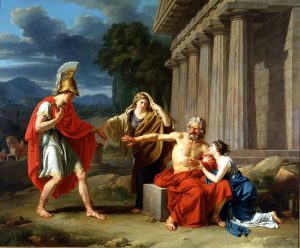7 Freud, Incest, and Hamlet
Ryan French

The early foundations of psychoanalytic theory suggest that the true nature of the human mind is only accessible by indirect means, such as dreams. Through these indirect platforms, the unconscious desires of the human mind are given a means to express themselves.
Like dreams, literature can also function as a platform for unconscious desires to come to fruition. In the Rivkin and Ryan book, it is said that Freud “notices that literary texts are like dreams; they embody or express unconscious material in the form of complex displacements and condensations” (394).
This means that, in psychoanalytic theory, literature is an “indirect” platform for humans to convey their repressed desires, feelings, and drives. Literature “displaces” and “condenses” these repressed characteristics, projecting them onto the writing in a succinct way, such as through metaphor.
By doing this, the human mind is able express its unconscious matter in a way that doesn’t jeopardize its place in civilized society.
An example of psychoanalytic theory can be seen in Shakespeare’s Hamlet. Hamlet is often considered to be a prime example of the Oedipus complex, one principles found in Freud’s psychoanalytic theory.
The Oedipus complex describes boys as being sexually attracted to their mothers during childhood. Consummation is never achieved, however, because fathers prevent the sexual relationship from going further. Boys then identify with their fathers’, since they are filling the role they want to be in. Through this identification, boys learn to sexually desire other women instead of their mothers’, and repress their incestuous feelings.
In Hamlet, Hamlet is distraught when he learns that his mother has married his uncle immediately after his father’s death. Hamlet talks about revenge, but takes a long time getting around to it.
Through a psychoanalytic lens, it could be said that the reason for this is because his uncle has now filled in the shoes of his father. Hamlet unconsciously desires his mother, but due to the Symbolic Order of society, was never able to consummate his sexual attraction.
The next best thing for his to do, however, was to take on his father as a role model. Once his father dies, his uncle fills this role. Because Hamlet now identifies his uncle as the man filling the role he wishes to be in, he has trouble disposing of him. This is an example if the Oedipus complex.

